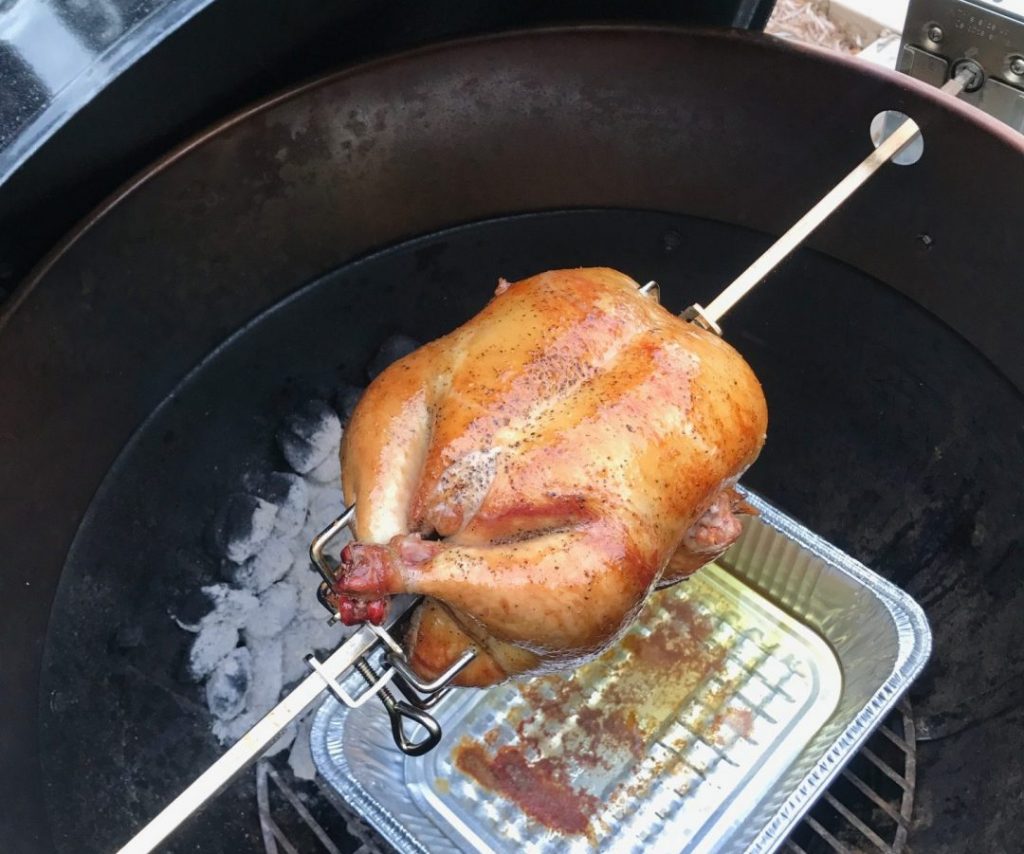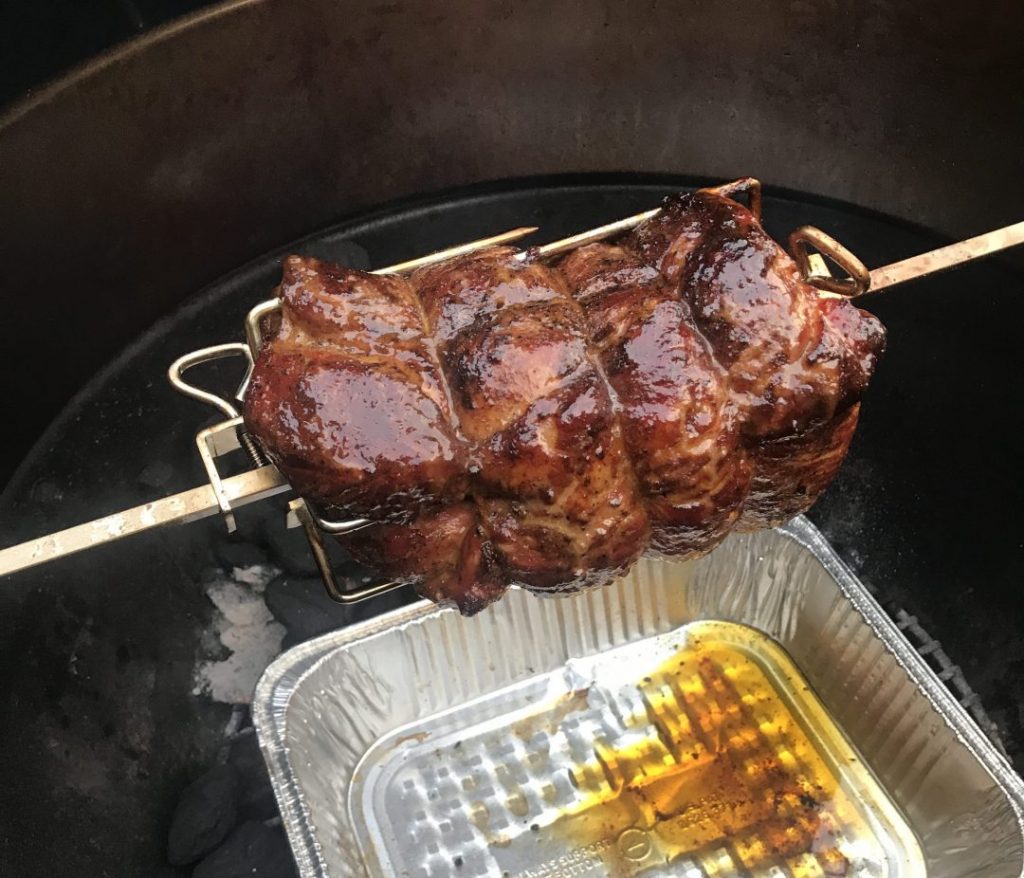This rotisserie chicken recipe is by my contributing writer, Jon Solberg. He's one of the most innovative grillers I've ever met. You can read all about him in his bio.
I’ve been enjoying the pastime of live fire cooking for a long time. Something I haven’t done until now, but always wanted is the use of a rotisserie.
I can’t really say I have any memories of my family doing any outdoor grilling but it seems to me that everyone had a rotisserie motor and spit someplace in a shed or hanging on the garage wall. I don’t know why those contraptions were always intriguing to me, as I’d never seen one in use.
For the past year or so I’ve spent some time online looking at rotisserie gear and reading reviews. I've been trying to decide if it was a worthwhile investment for me.
Is it something I would really use enough to justify a purchase? Is it really any better than just throwing the meat on the grill? Despite the overthinking, deep down inside I just wanted to give it a try.
Then it happened: Derrick Riches and Sabrina Baksh’s second book, “The Rotisserie Grilling Cookbook: Surefire Recipes and Foolproof Techniques” hit the market.
You can get the book on Amazon and lots of other online outlets. While there’s no lack of info out there on the subject, I just can’t say enough about Sabrina and Derrick's talent when it comes to getting it down on paper in an easy-to-follow, simple way, and the photos are fantastic. It’s a great book to have on the shelf for sure.
Gear
When it comes to what gear to get, there are a lot of options out there. My plan was to set up a 22” Weber kettle. After looking at reviews, comparing prices and weeding through the confusion I decided to go with the Onlyfire Universal Stainless Steel Charcoal Kettle Rotisserie Ring Kit.
There was still an additional choice to make – new style or old style? The reviews really didn’t differentiate between the two models, however in the images it appeared that the new style may have a better fit to the base of the kettle.
There was also the fact of cost – it was a few dollars cheaper than the old style. Purchasing the kit in black as opposed to stainless will save you some money as well.

I was so excited to get it in my hands, I unpacked it right in the driveway and tested the fit on the kettle. The kit came with everything I needed to get going. It's also well-built and I was pleasantly surprised about that.
Trying out the Rotisserie
Now it was time to give it a go. I headed to the market in search of a few chickens, and then did a quick internet search to see how to lay the fire.
My process is a bit “seat of the pants”, but sometimes that’s the fun part. I found a great short video by Mike Lang at Weber. This pretty much gives you all you need to get kettle or a gas grill set up and cooking with a rotisserie.
One additional thing I did was spray the spit and forks down with some cooking spray. I do this with most of my accessories, it just makes the clean up a lot easier. It does however make the set up a bit slippery so be careful.
I wanted to go simple. I went with just salt and pepper then on the roto it went. The dome thermometer in the kettle was in the 350 range so the temp was a bit lower than that where the bird was.
In my opinion, if the dome temp of your grill is 350° to 400°F, you're in a good place. I checked the IT (internal temperature) every half hour. This also gave me a chance to check on how things were working with the new gear.
Everything was going smoothly. Once the lowest IT I could find in the chicken was 165°f (as checked with a Thermapen internal read thermometer), it had been cooking for about an hour and 15 min. I pulled the chicken off and got it in a covered foil pan for a quick rest.
Additional Tips and Overview
I want to take a minute here and talk about a few things about handling the spit and forks at the removal stage of the game. Not to be Capt. Obvious but IT'S HOT! Try to think this over before you get to this stage of the game.
You’re going to need heat resistant hand protection. Also, the cavity of the chicken contains a lot of hot liquid. Once you pull the spit out of the motor, tilt it down and let the liquid run out into the dip pan.
The bottom line is this chicken was the best I’ve ever done on a grill. It was just that awesome. It’s a fast, simple and affordable method. I’m so happy with the results and don’t foresee picking up any store-made rotisserie chickens again.
I’m really excited to be creating on this new tool. So, what’s next? How about some rotisserie pulled pork?

This article was written by our contributor, Jon Solberg, Expert Outdoor Cook who Makes His Own Charcoal! Jon enjoys long walks on the beach and good comedy … just kidding!
A student all things outdoor cooking. Both low and slow or hot and fast. Charcoal, wood or gas it doesn’t matter. Not a big believer in the dogma of outdoor cooking. Continually looking for different ways. Loves to restore grills and smokers of all kinds. Born and raised in Mid-Michigan and understands there’s no off season in live fire cooking.
*Affiliate links have been used in this post. If you purchase anything on the links, the site may make a small commission to help keep delivering great content to you!*
Check out these related posts!







